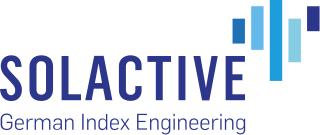Purchasing power parity (PPP) is the measurement of prices in different countries that uses the prices of specific goods to compare the absolute purchasing power of the countries' currencies. In many cases PPP produces an inflation rate equal to the price of the basket of goods at one location divided by the price of the basket of goods at a different location. The PPP inflation and exchange rate may differ from the market exchange rate because of tariffs, and other transaction costs.

In finance, an exchange rate is the rate at which one currency will be exchanged for another currency. Currencies are most commonly national currencies, but may be sub-national as in the case of Hong Kong or supra-national as in the case of the euro.
An exchange-traded fund (ETF) is a type of investment fund and exchange-traded product, i.e. they are traded on stock exchanges. ETFs are similar in many ways to mutual funds, except that ETFs are bought and sold from other owners throughout the day on stock exchanges whereas mutual funds are bought and sold from the issuer based on their price at day's end. An ETF holds assets such as stocks, bonds, currencies, futures contracts, and/or commodities such as gold bars, and generally operates with an arbitrage mechanism designed to keep it trading close to its net asset value, although deviations can occasionally occur. Most ETFs are index funds: that is, they hold the same securities in the same proportions as a certain stock market index or bond market index. The most popular ETFs in the U.S. replicate the S&P 500 Index, the total market index, the NASDAQ-100 index, the price of gold, the "growth" stocks in the Russell 1000 Index, or the index of the largest technology companies. With the exception of non-transparent actively managed ETFs, in most cases, the list of stocks that each ETF owns, as well as their weightings, is posted daily on the website of the issuer. The largest ETFs have annual fees of 0.03% of the amount invested, or even lower, although specialty ETFs can have annual fees well in excess of 1% of the amount invested. These fees are paid to the ETF issuer out of dividends received from the underlying holdings or from selling assets.
A commodity price index is a fixed-weight index or (weighted) average of selected commodity prices, which may be based on spot or futures prices. It is designed to be representative of the broad commodity asset class or a specific subset of commodities, such as energy or metals. It is an index that tracks a basket of commodities to measure their performance. These indexes are often traded on exchanges, allowing investors to gain easier access to commodities without having to enter the futures market. The value of these indexes fluctuates based on their underlying commodities, and this value can be traded on an exchange in much the same way as stock index futures.

The Korea Composite Stock Price Index or KOSPI (코스피지수) is the index of all common stocks traded on the Stock Market Division—previously, Korea Stock Exchange—of the Korea Exchange. It is the representative stock market index of South Korea, like the S&P 500 in the United States.
In Statistics, Economics and Finance, an index is a statistical measure of change in a representative group of individual data points. These data may be derived from any number of sources, including company performance, prices, productivity, and employment. Economic indices track economic health from different perspectives.

The Bucharest Stock Exchange (BVB) is the stock exchange of Romania located in Bucharest. In 2019, the capitalization of BVB increased 23.4% compared to the previous year, to the value of EUR 37.8 billion. At the end of 2019 there were 83 companies listed on the BVB.

The MSCI World is a market cap weighted stock market index of 1,546 companies throughout the world. It is maintained by MSCI, formerly Morgan Stanley Capital International, and is used as a common benchmark for 'world' or 'global' stock funds intended to represent a broad cross-section of global markets.

Canadian Securities Exchange (CSE), operated by CNSX Inc., is a stock exchange domiciled in Canada. When recognized by the Ontario Securities Commission in 2004, CSE was the first new exchange approved in Ontario in 70 years. The CSE is a rapidly growing stock exchange focused on working with entrepreneurs to access the public capital markets in Canada and internationally. The Exchange's efficient operating model, advanced technology and low fee structure help companies of all sizes minimize their cost of capital and maximize access to liquidity.
The international dollar, also known as Geary–Khamis dollar, is a hypothetical unit of currency that has the same purchasing power parity that the U.S. dollar had in the United States at a given point in time. It is mainly used in economics and financial statistics for various purposes, most notably to determine and compare the purchasing power parity and gross domestic product of various countries and markets. The year 1990 or 2000 is often used as a benchmark year for comparisons that run through time. The unit is often abbreviated, e.g. 2000 US dollars or 2000 International$.
The Kazakhstan Stock Exchange is a stock exchange located in Almaty, Kazakhstan. The exchange was founded in 1993.
In May 2006, Deutsche Bank launched a new set of commodity index products called the Deutsche Bank Liquid Commodities Indices Optimum Yield, or DBLCI-OY. The DBLCI-OY indices are available for 24 commodities drawn from the energy, precious metals, industrial metals, agricultural and livestock sectors. A DBLCI-OY index based on the DBLCI benchmark weights is also available and the optimum yield technology has also been applied to the energy, precious metals, industrial metals and agricultural sector indices. Like the DBLCI, the DBLCI-OY is available in USD, EUR, GBP and JPY on a hedged and un-hedge basis. The DBLCI-OY is rebalanced on the fifth index business day of November when each commodity is adjusted to its base weight. The DBLCI-OY is also listed as an exchange-traded fund (ETF) on the American Stock Exchange.
CBV Vietnam bond Indexes is a listing of bonds or fixed income instruments and a statistic reflecting the composite value of its components. It is used as a benchmark to evaluate the market value of all Vietnamese bonds.
S&P Dow Jones Indices LLC is a joint venture between S&P Global, the CME Group, and News Corp that was announced in 2011 and later launched in 2012. It produces, maintains, licenses, and markets stock market indices as benchmarks and as the basis of investable products, such as exchange-traded funds (ETFs), mutual funds, and structured products. The company currently has employees in 15 cities worldwide, including New York, London, Frankfurt, Singapore, Hong Kong, Sydney, Beijing, and Dubai.

In finance, a stock index, or stock market index, is an index that measures a stock market, or a subset of the stock market, that helps investors compare current stock price levels with past prices to calculate market performance.

The United States dollar was established as the world's foremost reserve currency by the Bretton Woods Agreement of 1944. It claimed this status from the British pound sterling after the devastation of two world wars and the massive spending of Great Britain's gold reserves. Despite all links to gold being severed in 1971, the dollar continues to be the world's foremost reserve currency. Furthermore, the Bretton Woods Agreement also set up the global post-war monetary system by setting up rules, institutions and procedures for conducting international trade and accessing the global capital markets using the U.S. dollar.
The Wall Street Journal Dollar Index is an index of the value of the U.S. dollar relative to 16 foreign currencies.

Solactive is a German provider of financial indices based in Frankfurt. The company develops, calculates, and markets cost-efficient indices over several asset classes, including equity, fixed-income, and commodity indices. Solactive also engages in the development and branding of complex strategies, which are not based on traditional underlyings such as stocks and bonds, but instruments like funds, life insurance products, or basket of currencies.
VN30 Equal Weight Index tracks the total performance of the top 30 large-cap, liquid stocks listed on the Ho Chi Minh City stock exchange along with two popular indices in Vietnam: VN Index and VN30 Index. All index constituents are equal-weighted to help investors deal with liquidity, foreign ownership and state-owned enterprise constraints when investing in Vietnam.







